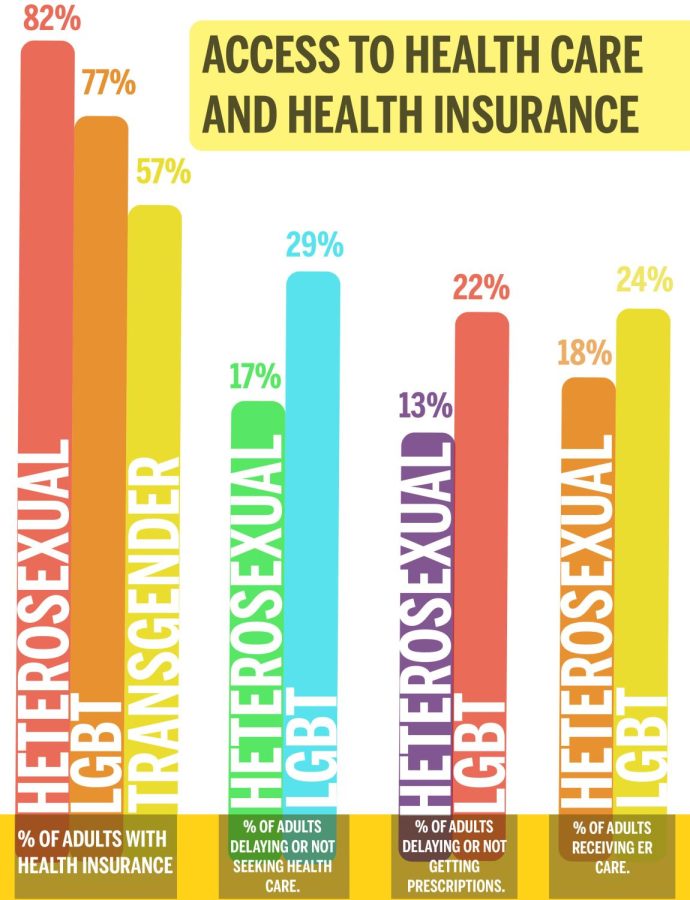American Health Care Act could affect transgender insurance coverage
In a study done by the Center for American Progress, the center found there were disparities in health and insurance coverage between LGBTQ people and heterosexuals.
The proposed replacement for the Affordable Care Act — the American Health Care Act — labels transsexuality as a “pre-existing condition.”
The Washington Post reported in a May 4 story, “The measure proceeded without the benefit of an analysis from the Congressional Budget Office of its cost and impact on insurance coverage, and it did so after many Republicans openly acknowledged that they hadn’t read the bill.”
Under the ACA, regulatory policies stopped businesses from discriminating against consumers based on gender, race or sexual orientation.
Under the new AHCA, insurance companies may be able to evaluate each applicant and set higher premiums based on what they deem pre-existing conditions. Transgender people could be at risk of their gender identity falling into this category.
MJ Eckhouse, a senior political science major and editor for Fusion magazine, said the new act would further complicate an already lacking system for transgender health care.
Eckhouse said his own insurance only covers some of his health care needs.
“My health insurance doesn’t cover a lot of things for transition-related care, but it does cover some,” he said. “I don’t want to give the false impression that things are completely fixed for trans-healthcare now because they are not.”
As a transgender man, Eckhouse said, before the ACA, he could be denied necessary medical exams.
“If a trans-man gets a Pap smear or trans-woman gets a prostate check, those things, before the (ACA), could be denied healthcare coverage.” he said, “The (ACA) was fixing that. It wasn’t perfect, but it was a lot better.”
Katie Mattise, Kent State LGBTQ Student Center program coordinator, finds fault in the bill’s definition of a pre-existing condition.
“A ‘pre-existing condition’ is too open for interpretation, and it makes insurance less affordable because of higher premiums,” she said.
Economics professor Kathryn Wilson studied the impact of healthcare on the economy.
“Right now, (one out of every five) dollars we spend in the United States is being used for health care bills,” Wilson said. “We spend a lot more on healthcare per person ,and we don’t tend to get better results.”
Despite these setbacks, Ken Ditlevson, director of the LGBTQ Student Center, said students who need coverage have options.
“We have student insurance that people can buy and cover trans-related medical expenses,” he said.
The progress the ACA made may be in jeopardy, Ditlevson said.
“We were really excited with the Affordable Healthcare Act because it was really going to set some things in motion for some major change,” he said. “In particular, trans healthcare.”
The American healthcare system had started to make advances under the ACA, Wilson said.
“Undeniably, we would (take) some huge steps back in terms of people’s ability to have access to insurance,” she said.
According to the Center for American Progress, there are disparities in both health and coverage between the LGBTQ and heterosexual populations, which to them means every person should be evaluated based on gender, sexual orientation and ethnicity because health outcomes vary greatly based on these demographics.
“To improve overall public health and to use public dollars most effectively and efficiently, the government must consider these factors when crafting public health programs and policies,” said Jeff Krehely, the director of the LGBT Research and Communications Project at the center, in an article regarding the center’s findings.
Eckhouse’s parents are small business owners so they do not have access to employer – provided coverage. The new bill will affect both his and his family’s ability to stay covered, he said.
“I’ll probably have to go to Medicaid myself,” he said. “My family will probably just go without health insurance coverage if this was to pass because it will raise rates so much.”
Students should do more than hope for change, Mattise said.
“I think students, young adults, and really everyone should do something,” she said. “What that something looks like depends on what you’re able to do. You can call or write your representatives. You can go to or organize a demonstration or protest. You can talk to family members or friends. You can get into politics and run for office . . . (the) important thing is to stay informed and do something, while also taking care of yourself in ways that work for you.”
Cody Patton is the diversity reporter, contact him at [email protected].



